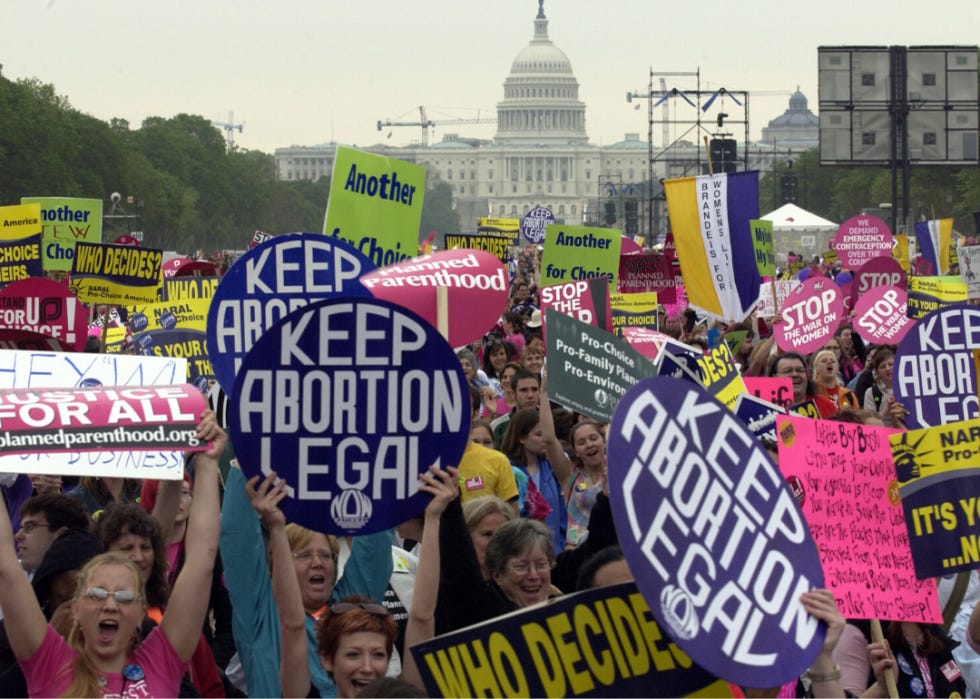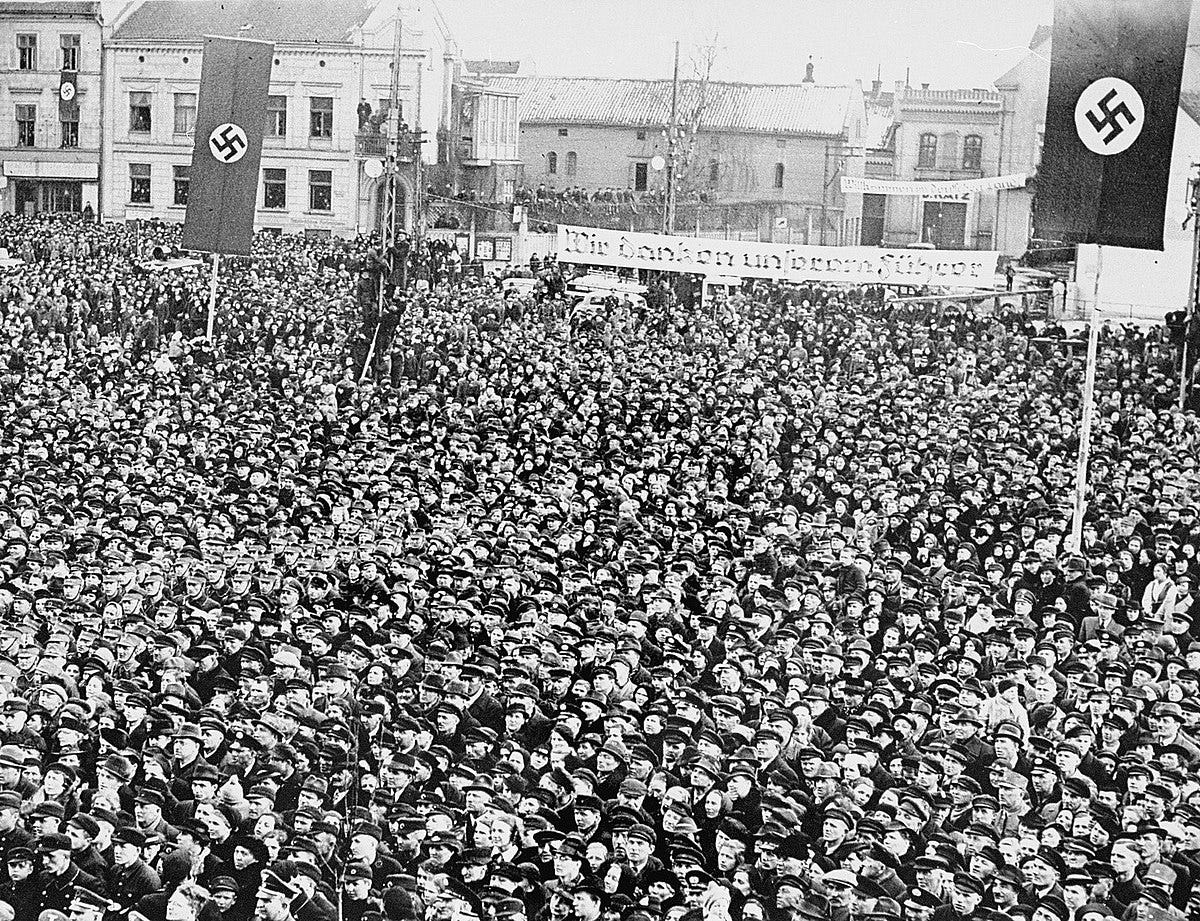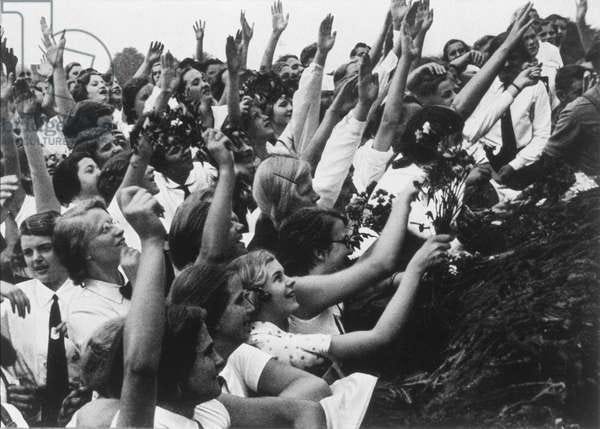We, The People, Have Unimaginable Power
But if we don't use it, all is lost.
Anyone even casually acquainted with me knows I’m a rabid fan of Starz network’s 2009-2010 series, Party Down, a sitcom about a group of actor/caterers hoping to make it in Hollywood. Perhaps, having been someone who dipped her pinky toes in those waters many years ago, I empathize with the characters’ doomed aspirations. Mostly, I see things the way Adam Scott’s failed actor, Henry Pollard, sees them, which is that Hollywood is so patently absurd, there’s no point in trying. Henry makes giving up look as debonair as a Fred Astaire tap number.
In Season 1, Episode, 2, "California College Conservative Union Caucus,” the Party Down caterers work an event where Governor Arnold Schwarzenegger is the keynote speaker. Before his arrival, the college conservatives try cobbling together a slogan for next year’s event. “Together, We’re Building a Better, Brighter Tomorrow” is voted down by a guy in a argyle sweater vest who articulates the group’s misgivings: “I feel that ‘together’ sounds kind of socialist.” Around him, other conservatives nod their heads in agreement.
Ah, if only that were a joke.
As naked hairless apes, we are inherently tribal. Our instinctive, emotion-driven, hormone-poisoned brains are no different than they were two millennia ago. This is why, of course, we’ve never done the one thing, the only thing, that is guaranteed to eradicate debt-peonage, world hunger, discrimination, gross inequities in income distribution, tax loopholes, dark money infusions into political campaigns and offshore tax havens, and to ensure clean water, clean air, a decent public education, affordable housing, free healthcare, affordable child care, a livable minimum wage, and laws prohibiting any social media platform from falling into the hands of a megalomaniac.
What is the one thing that will save us?
We, the people.
When we unite with enough force and sufficient strength in numbers, there is nothing we can’t accomplish. The one-percenters, despite their obscene wealth, know this. They’ve always known it, which is why protests are so violently quelled.
When aggrieved Catholics in Tudor England marched on London to protest Henry VIII’s divorce from the Church of Rome, Henry’s fear can be measured by he ruthlessness with which he dispatched its ringleaders. More recently, when then-President Donald Trump held a Bible outside St. John’s Church in Lafayette Park, Black Lives Matter protesters were brutally teargassed.
Fear always erupts as anger. Always. There are no exceptions to this rule. We are the panicked monkeys I spoke of in this recent Cappuccino. And when we’re afraid, we are capable of any atrocity. Just look at this past century. Hitler’s fear and paranoia, and by extension, Germany’s, resulted in the mass murder of millions of Jews, Poles, Catholics, Romani, and homosexuals. Because of Pol Pot’s thirst for genocide, millions of Cambodians died as a result of his Khmer Rouge policy, between 21% and 24% of Cambodia's entire 1975 population. But did any of this need to happen? Could there have been a different outcome?
If, as the Bible exhorts us, we were truly our brothers’ keepers, the people of every country should have banded together to stop it. By the sheer superiority of our numbers, we could have toppled the Khmer Rouge, Hitler, Putin, and every other would-be despot. We could accomplish this without shedding a single drop of blood. By simply flooding the streets, united by a single objective, we have the power to change the world.
This is all theoretical, of course. Even if we could overcome our petty differences, there are logistical issues to getting every able-bodied human to convene at the same time on a single point. But even if ten million showed up, stood in front of any government building and refused to leave, Hitler himself couldn’t have stopped us. We would have overwhelmed him.
Few sights on earth are more terrifying than a mass of angry villagers coming toward you, even those not armed with torches and pitchforks. The most chilling images I’ve ever seen are the ones of city streets packed with Germans cheering Hitler. In addition to the superiority of his war stratagems, at least at the beginning of World War II, Hitler’s success can be attributed to the massive support of his own people. His ability to unite Germany remains unparalleled in modern history.
Mob mentality is an ugly thing when it’s pointed in the wrong direction. So, what happens when we point it in the right one?
Here are three instances where mass protest effected revolutionary change. I offer them not as a history lesson, but as inspiration for the near future. I predict that the minute our Supreme Court overturns Roe v. Wade, the law allowing women access to reproductive healthcare like abortion, there will be an uprising of men, women, and children this country has never seen. Not just the progressive left, but silent centrists and left-of-center conservatives will march on Washington, demanding justice. Let’s see if I’m right.
1913: Women’s Right to Vote
It may or may not surprise you to learn that nowhere in the U.S. Constitution are women mentioned. We’re not even part of the “Three-Fifths Clause” declaring that Black slaves could only be counted as three-fifths of a person for purposes of congressional representation. We weren’t allowed to vote or even own property until the Married Women's Property Act of 1848. Husbands were legally permitted to beat us, rape us, and claim our wages for their own use. Not until the great British polemicist Mary Wollstonecraft wrote A Vindication of the Rights of Women in 1792 was the subject of women’s rights even publicly discussed. The road to suffrage has been a long one spanning centuries and generations.
Then in 1913, ahead of President Woodrow Wilson’s inauguration, an estimated 8,000 protesters marched down Pennsylvania Avenue, demanding that women be granted the right to vote. People who opposed it violently assaulted the demonstrators, but the public outrage was such that it actually increased support for women’s suffrage. In 1920, the 19th Amendment granting women the right to vote was finally passed.
1955: The Montgomery Bus Boycott
After one of the great sheroes of the 20th century, Rosa Parks, was arrested for refusing to give up her bus seat to a white passenger, the Black community in Montgomery, Alabama, organized a citywide boycott of the bus system. This came at great personal sacrifice since many depended on the bus system to transport them to work. The boycott lasted for more than a year until a court order was finally issued, demanding that buses permit integration. The Reverend Martin Luther King had a seminal role in this, proving that sustained mass protest, a great leader, and the power of the people can move mountains.
1969: Stonewall Inn Riots
On June 28, 1969, New York City police raided a gay bar called the Stonewall Inn. For the next six days, rioting and violent protests occurred on city streets, a shot heard around the world, one that ignited a global LGBTQ movement, which continues to this day. This watershed event led to the first gay pride marches on June 28, 1970, in New York City, San Francisco, Chicago, and Los Angeles. Gay rights organizations were founded shortly thereafter.
Each of the following protests, or series of protests, has resulted in social, political, or legislative change:
1773: The Boston Tea Party (taxation without representation)
1848: The Seneca Falls Convention (first women’s rights convention)
1874: The Women’s Crusade (Prohibition)
1911: Triangle Shirtwaist fire protests (labor rights/safety)
1960: The Greensboro sit-in (racial segregation at Woolworth’s lunch counter)
1963: March on Washington (racial equality)
1965: Selma to Montgomery march (to end the suppression of black voters)
1968: Holy Week Uprisings (to revive a bill for federal fair housing)
1968: Bra burning at Miss America pageant (to protest repressive beauty standards)
1969: Vietnam War protest
1970: Sit-in at Ladies’ Home Journal office (fair labor practices)
1970: Kent State University (war protest)
1976: Marches for the Equal Rights Amendment
1979: National March on Washington for Lesbian and Gay Rights
1981: Solidarity Day march (in support of unions)
1982: Anti-nuclear protest in Central Park
1987: Second National March on Washington for Lesbian and Gay Rights
1992: Los Angeles uprising (after the police officers who beat Rodney King were acquitted)
1993: March on Washington for Lesbian, Gay, and Bi Equal Rights and Liberation
1995: Million Man March (in support of Black men and to register them to vote)
1997: Million Woman March (to united Black women)
1999: Seattle World Trade Organization protests (globalization and wealth inequality)
2000: The Million Mom March (increase gun control legislation)
2003: Iraq War protests
2004: March for Women’s Lives (protection of abortion rights)
2006: The Day Without an Immigrant (the protection of immigrant labor)
2011: Occupy Wall Street (to protest economic inequality)
2013: First Black Lives Matter protests (after Zimmerman is acquitted of murdering Trayvon Martin)
2014: People’s Climate March
2016: Dakota Access Pipeline protests
2017: The Women’s March on Washington (also a demonstration against newly elected president Donald J. Trump)
2018: Women’s March (#MeToo inspired call for an end to the suppression of women)
2019: Telegramgate protests in Puerto Rico (hundreds of racist and homophobic messages sent by former Gov. Ricardo Rosselló were leaked to the public, leading to his resignation a few weeks later.)
2019: September 2019 climate strike
2020: Black Lives Matter (police brutality)
History shows us that we, the people, have the power to change the world. It may start with a few brave voices, but in the end, it requires all of us to work together to effect that change. There are good lawmakers on Capitol Hill, but not nearly enough of them to do what needs to be done.
That’s where you come in.
Organize. March. Protest. When you take the long view, you realize that it may take a few weeks or a few generations, but if enough pressure is brought to bear, change will happen.
But it’s not going to come from them. It’s going to come from us. It’s easier to hate the obstructionists, I know. There’s no time for that. We must act now, and above all, we must act together.
Get involved. Do your part. You have so much more power than you know.
Use it now before it’s too late.
Speak up, speak up, speak up. Leave your comments below. If you enjoyed this article, share it.
Copyright © 2022 Stacey Eskelin





"Fear always erupts as anger." -- A therapist of mine used to say, "Fear is the hand, anger is the glove."
By the bye, things certainly haven't changed in a mere 2 millennia, but you could probably have extended that an easy three orders of magnitude to two million years.
Another by the bye, the 1963 March on Washington was centrally a *labor* movement. The largest organizer of the event was the CIO (this was before they joined the AFL.) An excellent source of essays and speeches by King demonstrating this long standing connection between the labor and American Civil Rights movements is "All Labor Has Dignity," edited by Michael K. Honey (who is also an exceptional King scholar.) That terrible April day in Memphis, King was supporting the black workers in the city's garbage collection services.
I can, perhaps, be forgiven for sharing this:
https://www.youtube.com/watch?v=JAUrab7mgmQ